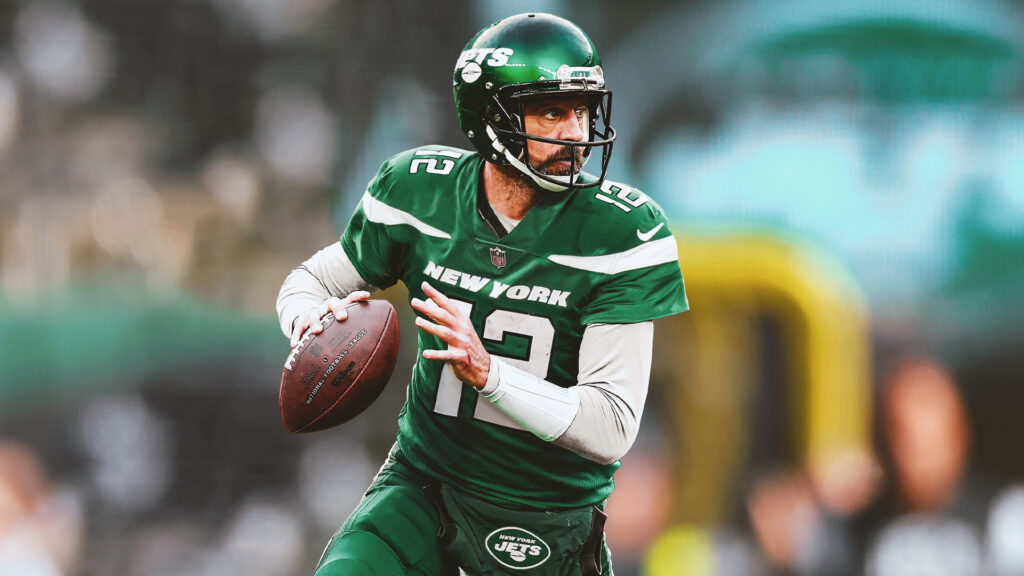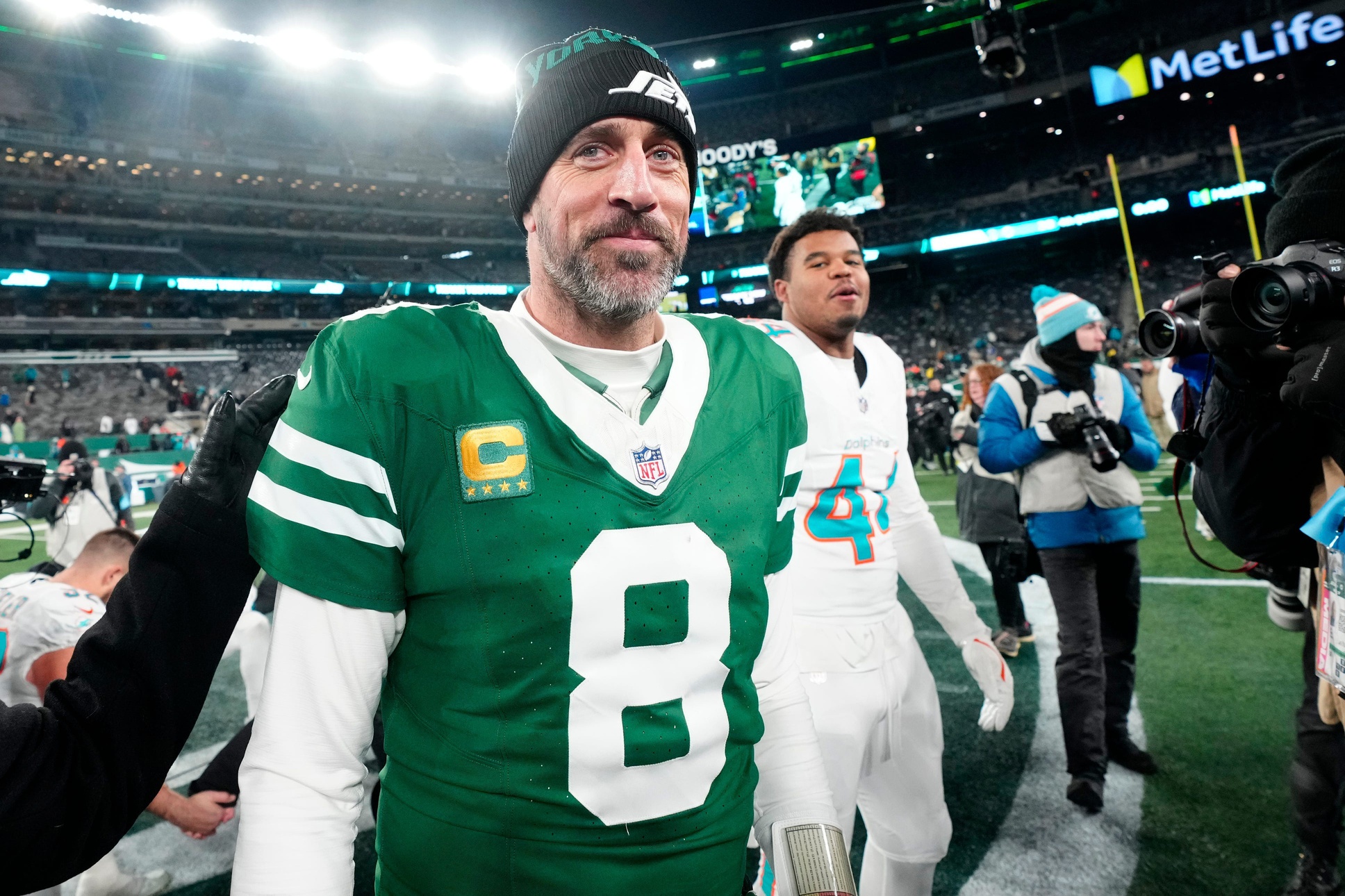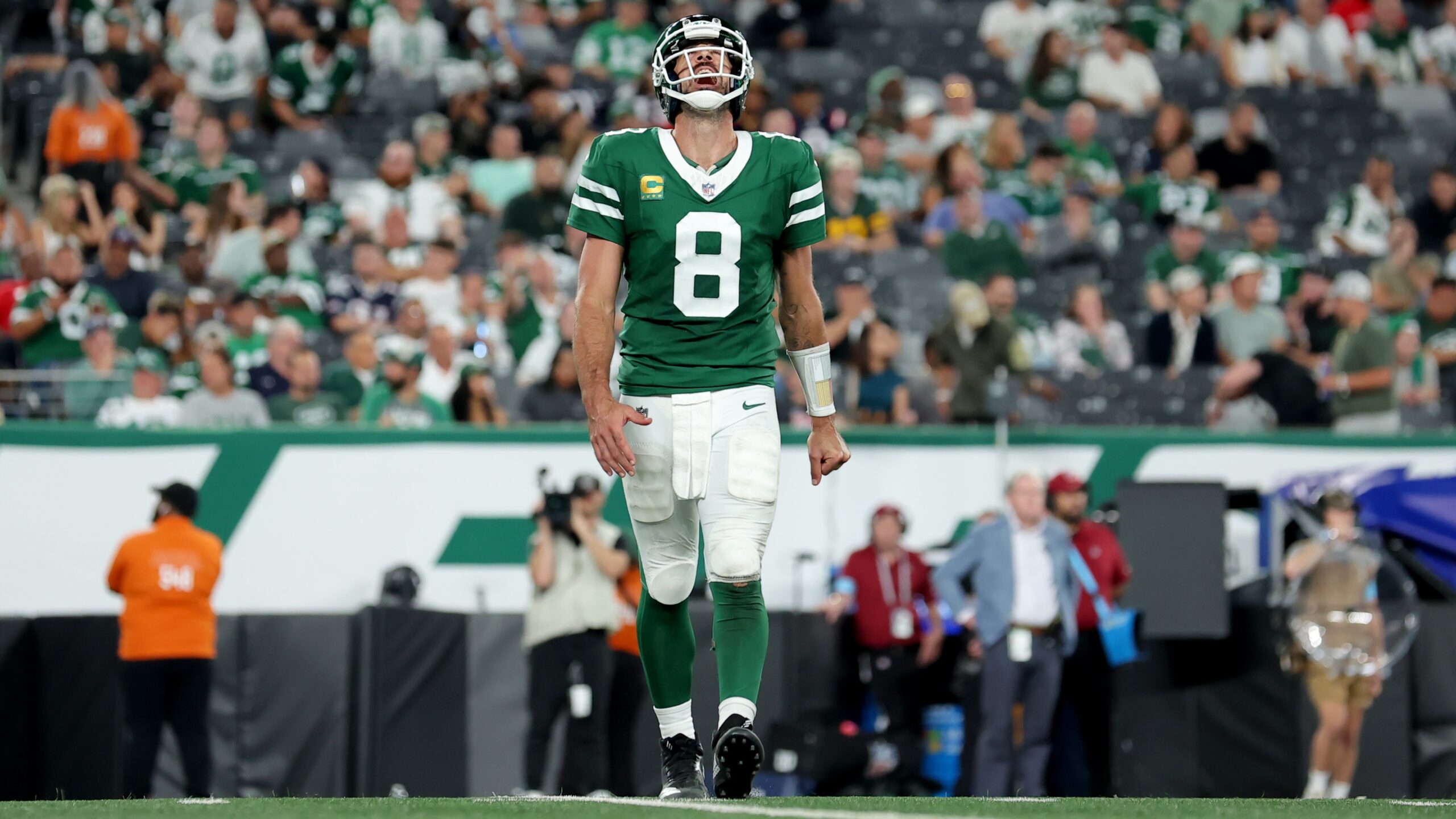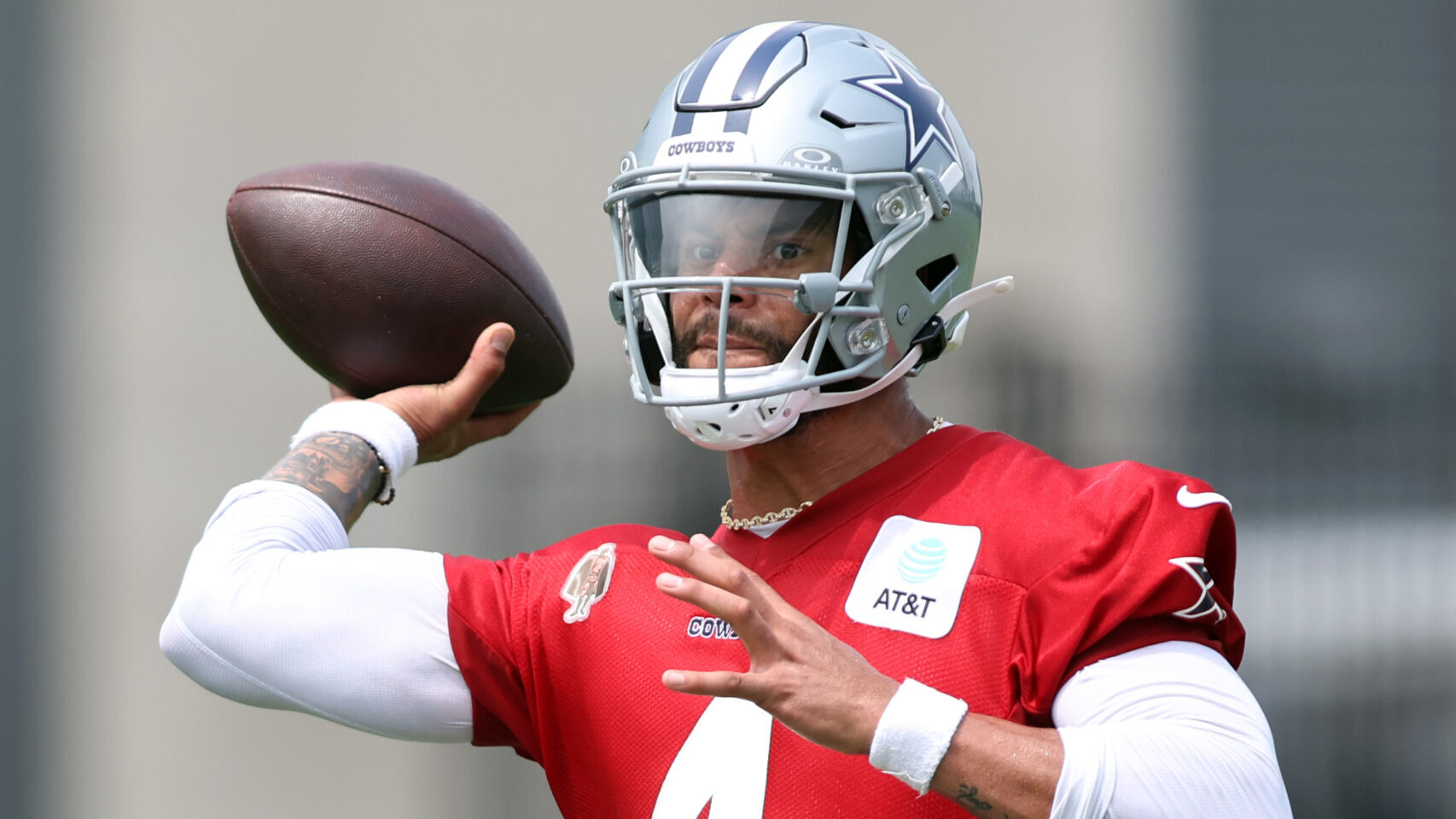Analysis
4/24/23
7 min read
Rodgers Makes Jets Playoff Team, but Still Fall Short of AFC's Elite

When I’m hosting a show and a headline-worthy story breaks, I like to use one evergreen, open-ended tee-up like this: One sentence to sum up the big news, followed by a quick “Where does your mind go?” It usually leads to a good response and fun interaction when the newness and gravity of a big story are at their peaks.
So, I’m trying it on myself with the massive, albeit expected, quarterback news of the day: Aaron Rodgers is officially a New York Jet. So where does my mind go? It goes to three places.
From Derek Carr to Tom Brady and Matthew Stafford, to Patrick Mahomes, Joe Burrow and Josh Allen. Follow me here.
I wrote an article about Carr last month before he signed with the New Orleans Saints, motivated by a line I’d heard a lot at the end of the season regarding a number of competitive, respectable teams that had decent seasons but lacked a playoff-caliber passing attack.
“That team is a quarterback away” is the often-heard summation that drove the feature. I wrote Carr would make that abstract team better, and likely lead them to the playoffs, but any expectation beyond that wasn’t realistic. Now that we know his specific team that description fits the Saints.
Now, we can attach the “that team is a quarterback away” idea to Rodgers and the Jets.
The 2022 Jets were the poster team for this concept. They had an excellent defense, a strong nucleus of young draft picks, an energetic head coach and they competed hard on most Sundays. But their passing game stunk. Zach Wilson was an anchor to a team ready to ascend, and their season fizzled.
The addition of Rodgers changes all of that. They go from being “a quarterback away” from relevance to hopefully being relevant in mid-January.
[bc_video video_id="6322573634112" account_id="6312875271001" player_id="default" embed="in-page" padding_top="56%" autoplay="" min_width="0px" playsinline="playsinline" picture_in_picture="" language_detection="" application_id="" max_width="680px" mute="muted" width="100%" height="100%" aspect_ratio="16:9" sizing="responsive" ]
With that said, what type of postseason staying power can Rodgers provide the Jets at this point of his career?
Since we love quarterback comps at this time of year, (Is Anthony Richardson the next Allen? Is Bryce Young the next Russell Wilson?) let’s find one for Rodgers' situation. There are recent veteran quarterback comparisons that can help us consider what Rodgers can do for the Jets.
In the past three seasons, Brady and Stafford left organizations they had defined for more than a decade for a fresh start. Both took a healthy combo of talent and motivation with them, and both landed with teams well-aligned for next-level success but needed a top-flight quarterback to get them there.
Brady came through for the Tampa Bay Buccaneers. Stafford came through for the Los Angeles Rams. That precedence bodes well for Gang Green. Let’s consider some facts about how Brady and Stafford produced a Lombardi Trophy shortly after arriving in their new cities before seeing if Rodgers can do the same.

Replicating Playoff Success
Brady was coming off a less-than-Brady type of season in New England, complete with a pick-six on his last pass in a home playoff loss. But his transition to Tampa Bay came with an MVP-caliber regular season. More importantly, when considering Rodgers' situation, Brady performed at or near that level in the postseason.
He was excellent in Tampa Bay’s first playoff win at the Washington Commanders, persevered past a pesky Saints defense in the Divisional Round, was the more clutch quarterback in the NFC Championship opposite Rodgers and was in command throughout a Super Bowl LV win over the Kansas City Chiefs.
As for Stafford, let’s contrast the four games that ended the Rams’ regular season to the four games they played in the postseason. In the four-game run-up to the playoffs, Stafford’s efficiency — or lack thereof — became the Rams’ biggest pre-playoff issue. He threw eight interceptions during that span, raising concern the team couldn’t sustain success. Yet when the playoffs arrived, Stafford took his game to another level.
He started the Divisional Round win at Tampa Bay with a flurry of completions, and ended with a 50-yard fadeaway strike to Cooper Kupp, setting up the winning field goal on the next play. The Super Bowl was a defensive battle, and Stafford threw two picks, but he threaded the needle on a handful of throws at critical moments. The Rams don’t win that game without him.
The snapshots of Brady and Stafford in their first seasons with new teams, and how they performed in the season’s biggest postseason moments, set the table as we turn our attention to Rodgers. For all the times he’s played well during long stretches, his level of play hasn't matched his high standards during the season's most important games.
Looking back at the games that ended Green Bay’s recent seasons, many of them coming at home, it’s hard to say Rodgers played poorly in any of them. It’s not that he had his worst game in the season’s most important game, but he produced a series of average ones.
This table shows Rodgers' stats from the last three times the Packers were eliminated from the playoffs.
| Year | Result | Passing Yds | Passing TDs | INTs | QB Rating |
| 2021 | L, 13-10 vs. 49ers | 225 | 0 | 0 | 91.9 |
| 2020 | L, 31-26 vs. Bucs | 346 | 3 | 1 | 101.6 |
| 2019 | L, 37-20 vs. 49ers | 326 | 2 | 2 | 97.2 |
If his first Jets season is going to follow suit with Brady’s first in Tampa Bay and Stafford’s first in Los Angeles, he’ll need to turn those OK performances into a string of terrific ones. It’s a high bar, but it’s the only way the Jets will achieve playoff success.
[bc_video video_id="6322576297112" account_id="6312875271001" player_id="default" embed="in-page" padding_top="56%" autoplay="" min_width="0px" playsinline="playsinline" picture_in_picture="" language_detection="" application_id="" max_width="680px" mute="muted" width="100%" height="100%" aspect_ratio="16:9" sizing="responsive" ]
Place Among AFC's Elite
This brings us to AFC heavyweights Kansas City, Cincinnati and Buffalo, and their MVP-worthy quarterbacks Mahomes, Burrow and Allen. They are Rodgers’ new AFC colleagues, to whom his every game will be compared.
Aside from maybe Allen’s mediocre stretch at the end of the season and Buffalo’s pedestrian play in the playoff loss to Cincinnati, there is nothing to suggest those three quarterbacks will take a step back this season. They’ve set a high standard, and it’s not a reach to say the arrow is pointing up for all three.
Were the Jets “a quarterback away” from being on the same level as those teams? No. But getting Rodgers instantly — and convincingly — elevates a competitive team to a playoff team. New York should graduate, with honors, from the AFC’s fledgling class to the brink of its upper class.
So, Rodgers to the Jets, where does my mind go?
To add the Jets to that small group, including the Los Angeles Chargers, Jacksonville Jaguars and Baltimore Ravens, if they can keep Lamar Jackson, as the teams closest to joining the AFC’s elite three.
They all need the exact same thing to get there: For their mega-star quarterback to be at his best throughout January.
One could make a compelling argument that Rodgers is the one most likely to get that done, sure. But until we see him do it in Green and White better than he’s recently done it in Green and Gold, I’ll label his Jets highly intriguing contenders, a certain arms’ length away from joining the favorites.
Paul Burmeister, a former starting quarterback at Iowa, is a studio host with NBC Sports and the radio voice of Notre Dame Football. For a decade he worked as a studio host at NFL Network. Follow him on Twitter at @PaulWBurmeister








